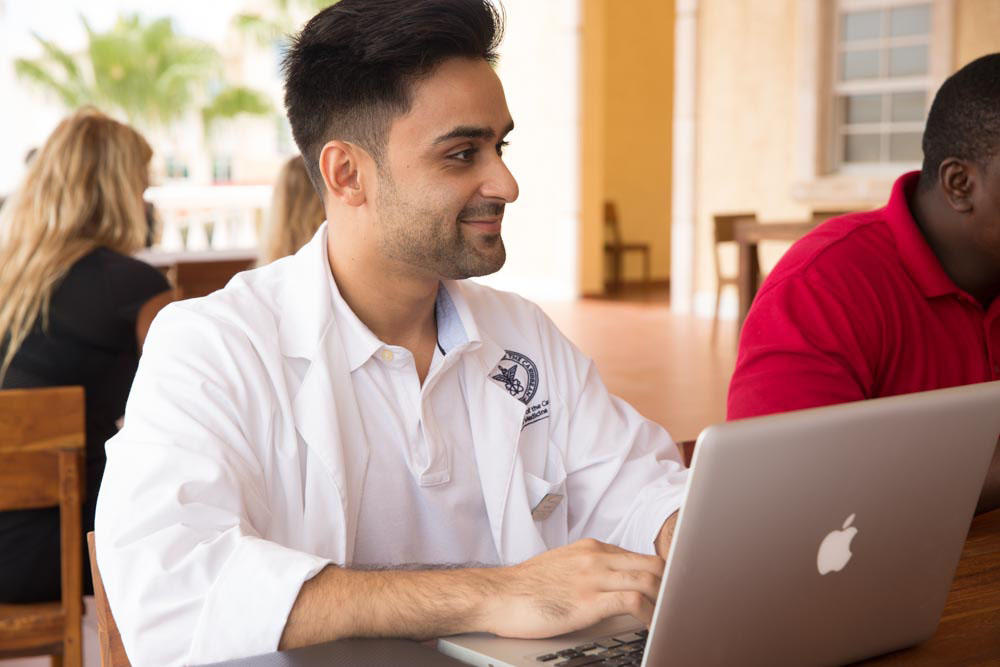What is family medicine? Family medicine is a medical specialty that centers on all-around medical care for every member of a given family. Versatile family medicine physicians treat ailments and provide comprehensive health care for people of all genders and all ages. Family physicians need a broad range of medical skills to diagnose and treat a wide variety of illnesses and conditions. They may help an infant with plagiocephaly, the infant’s father with conjunctivitis, and the infant’s grandmother with osteoporosis—all in consecutive examinations. A doctor of family medicine also needs excellent relational skills as they may care for members of a family for many years, modifying care and the approach to care as patients grow and age. If you are considering a career in family medicine, ask yourself these questions:
- Are you interested in providing medical care for entire families?
- Do you want to treat babies, kids, adults, and seniors all in the same day?
- Are you ready to learn a wide variety of medical skills?
- Can you assess a completely new set of symptoms for every patient?
- Do you want long-lasting relationships with patients?
If your answer to any of these questions is “yes,” then family medicine may be the career path for you.
WHAT DOES A FAMILY MEDICINE PHYSICIAN DO?
Family medicine is sometimes confused with internal medicine. Both internal and family medicine physicians provide primary care, but internists typically only treat adults. According to an estimate from the American College of Physicians, a typical family medical practice sees around 15% children and 85% adult patients. Also, a rising number of family physicians do not consist of obstetrics, neonatology, or surgery as part of their practices, which makes the care provided to adults seem similar to care provided by internists. You may wonder: what does family medicine mean? What is family medicine exactly? Family medicine physicians are skilled at general internal medicine as well as pediatric, adolescent, and geriatric medicines, and they tailor their clinical services to individual patients and situations. Family physicians may also concentrate more on preventive outpatient care—performing diagnostic tests, medical check-ups, screenings, or wellness visits—while internal medicine doctors deal more with curative inpatient and outpatient care.
Doctors of family medicine are important because they help patients navigate the health care system, recommending tests and treatments and referring patients to specialists when necessary. They understand community and social determinants of health, particularly as children grow into adolescence and young adulthood, as well as the impact a patient’s health may have on other members of the patient’s family. People often specifically choose to see family physicians so every member of the family can see the same doctor, allowing the creation of enduring and trusting relationships. Through familiarity with their patients—both medical histories and situations at home or at work—family doctors may be quicker to identify health problems or irregularities. Primary responsibilities of family doctors include:
- Accepting patients of all ages and genders
- Educating patients on everyday health
- Keeping health records and medical histories
- Maintaining good relationships with patients
- Managing common complaints as well as chronic illnesses
- Ordering and interpreting laboratory tests
- Performing health screenings, immunizations, and physical exams
- Performing various outpatient medical procedures
- Prescribing medications
- Providing primary care for all health issues
- Spotting early signs of emerging conditions or unusual symptoms
Family doctors may also assess weight and nutrition issues by recommending diet or exercise changes, counsel patients on family planning, and perform fertility testing. Family physicians may also treat emotional issues such as anger, grief, or stress, or refer patients to mental health specialists. Family doctors may also be skilled in such areas as biostats, critical review, faculty development, grant writing, epidemiology, and research methodology.
HOW DO YOU TRAIN FOR A CAREER IN FAMILY MEDICINE?
A family medicine physician must first earn a Doctor of Medicine (MD) degree or Doctor of Osteopathy (DO) degree by graduating from a four-year medical school—such as the American University of the Caribbean School of Medicine (AUCSM). The doctor must then complete a three-year residency in family medicine. The first year is usually spent in a hospital studying the many areas of internal medicine. The second and third years may be office-based as the residents become well-rounded in such outpatient medical disciplines as obstetrics/ gynecology, pediatrics, psychiatry, and adolescent, community, geriatric, and social medicines. After residency, qualified candidates are certified by the American Board of Family Medicine (ABFM), and they may apply for membership in the American Academy of Family Physicians. Doctors who want to subspecialize in a specific area of family medicine must take additional fellowship training approved by the Accreditation Council for Graduate Medical Education or the Royal College of Physicians and Surgeons of Canada. Fellowships last one to three years, during which family medicine doctors may subspecialize in:
- Addiction Medicine
- Adolescent Medicine
- Clinical Informatics
- Geriatric Medicine
- Hospice and Palliative Medicine
- Hospital Medicine
- Integrative Medicine
- International Medicine/ Global Health
- Maternal/ Women’s Health
- Pain Medicine
- Preventive Medicine
- Rural Health
- Sleep Medicine
- Sports Medicine
- Urgent Care
A family medicine residency may be combined with such specialties as disaster, emergency, or preventive medicine. Combined residencies are usually four years in length, and after successful completion of the residency, doctors may be “double-boarded”—certified by the ABPM as well the specialty board of their other medical discipline.
A CAREER IN FAMILY MEDICINE
What is a family medicine doctor’s normal work environment like? Family medicine physicians may work in a clinic, government agency, hospital, medical office, nursing home, public health department, or university, and many are in group or private family practice. Unlike most medical specialists who concentrate in cities, family physicians are evenly spread among all populations. In many underserved areas—particularly among rural populations—family physicians may be the only doctors available. Like all doctors, however, family physicians dedicate time to meetings and administration tasks, consulting with specialists, studying, and teaching. Most family medicine physicians work between 40 and 50 hours per week, and they are also often on-call—available for consultation at night or on days off.
Because family medicine physicians are needed for a wide variety of health and wellness issues, they can have a tremendous impact on the individual lives of patients as well as overall community health.
DEMAND FOR FAMILY MEDICINE PHYSICIANS
In 2019, Doximity, a trusted professional network for clinicians, issued a report on physician employment that listed family medicine as the most in-demand medical specialty in the United States. This is not a new development: multiple surveys have put family medicine at the top of the demand charts for more than a decade. As populations increase and people age, the demand for family doctors—and doctors in general—continues to grow. Every year, there are slightly more family physician jobs available than there are doctors to fill them. And like doctors in all medical fields—family medicine physicians are an aging population. As those doctors retire, the shortage of family medicine specialists increases. In July 2020, an Association of American Medical Colleges report showed that one third of U.S. physicians are age 60 or older, and well over half—57 percent—are over 50 years old.
Now that you know exactly what is family medicine, you can take the next step in your path to becoming a doctor. The AUC School of Medicine has a strong history of placing graduating students in family medicine and other specialty residencies. In 2020, 92 percent of AUCSM graduates matched residencies throughout the United States and Canada. Take the next step on your path to becoming a family medicine physician: apply for admission to AUCSM.
Related resources:





